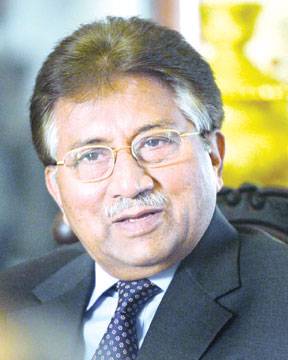ISLAMABAD - The Supreme Court on Monday ruled that the Special Court, hearing high treason case against former military ruler General (r) Pervez Musharraf, will decide the case after hearing prosecution only if the accused person fails to appear before the court on May 2.
The top court has also made it clear that Musharraf will have no legal rights of his defence in case he fails to appear.
A three-judge headed by Chief Justice Asif Saeed Khosa and comprising Justice Mansoor Ali Shah and Justice Muneeb Akhtar heard the review petition filed by Lahore High Court Bar Association (LHCBA) through its then president Advocate Taufeeq Asif for prosecuting Musharraf under the High Treason (Punishment) Act, 1973.
During the proceedings, Chief Justice Khosa questioned as to what will happen if Musharraf does not materialize his commitment of showing up on May 2. He remarked that the matter cannot be left open-ended.
Advocate Salman Safdar, counsel for Musharraf, informed the bench that Musharraf’s wife was contacted adding that the accused person decided his date of return as May 13 because he does not want to record his statement under Section 342 of Criminal Procedure Code (CrPC) through video link due to hundreds of documents.
He, however, informed the bench that he cannot guarantee on behalf of Musharraf as to whether his client will appear on May 2. The issue is his deteriorating health and he is undergoing chemotherapy currently, he further added.
The chief justice referred July 2016’s Special Court order wherein it was held that the accused cannot be tried in absence. The chief justice remarked that the federal government being the complainant in the case have not challenged it.
He remarked that the bench does not doubt anyone’s intent adding that the federation itself did nothing after 2016.
The counsel contended that an accused cannot be tried in his absence. However, the chief justice remarked that the accused person in the case had been appearing and charge was also framed. High treason is not an ordinary crime, the chief justice observed.
During the hearing, the bench took a break to ponder the future course of action after the 2016 orders of Special Court.
The bench then reassembled and ruled that the Special Bench shall decide the case ex-parte if Musharraf fails to appear before the Special Bench and he shall also lose his legal rights to defend himself.
The Special Court was constituted on November 20, 2013 to try Musharraf for offences of high treason under Article 6 of the Constitution read with Section 2 of the High Treason (Punishment) Act, 1973.
The then government of PML-N through Ministry of Interior on December 13, 2013 filed a complaint against Musharraf accusing him of subverting and abrogating the Constitution.
Summons were issued to Musharraf to appear before this Special Court, however, Musharraf in the name of security threats and medical concerns did not appear before the said court until March 31, 2014.
On 31 March of 2014, Musharraf put his attendance before the said court and formal charges were read but he pleaded not guilty to each charge.
The same day, counsel of the accused requested the Special Court to issue an order for removal of Musharraf name from the Exit Control List (ECL) so that he could travel abroad for medical treatment. The Special Court in its order held, “It is further made clear that unless an accused is in custody, a criminal court cannot restrict his movement. He can work for gain anywhere and get medical treatment at a medical facility of his choice.”
The order landed in Supreme Court which on March 16, 2016 ruled that the federal government was free to make its own decisions regarding any travel restrictions on Musharraf.
On medical grounds, Musharraf flew to Dubai after the then government removed the travel restrictions and ever since he did not return to Pakistan.






